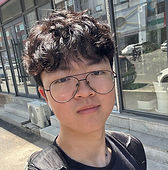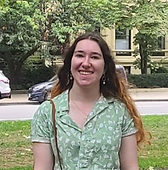Dr. Steven Del Signore
Research Scientist
I study the unique ways that neuronal synapses utilize the endocytic machinery. Despite decades of study, we still know very little about how synapses organize the proteins that control endocytosis in space and time. To answer this question, I perform live and super-resolution microscopy of the endocytic machinery at the fruit fly neuromuscular junction, and I develop new quantitative tools to analyze these data. To understand the mechanisms that control these proteins, I also study the interactions and activities of purified proteins and membranes in vitro. With these approaches, we are discovering that synapses control the endocytic machinery in ways that are quite distinct from non-neuronal cell types.
Dr. Cassandra Blanchette
Research Scientist and Lab Manager
My research is focused on the trafficking of endosomally-derived extracellular vesicles and their cargoes within an intact nervous system, using the Drosophila neuromuscular junction as a model. Extracellular vesicles are small membrane-bound vesicles released by cells that can transport physiological cargoes between cells for communication, dispose of unwanted cellular materials, and even spread pathological components between cells in disease. I’m working to understand how in neurons endosomal cargoes get sorted for release in extracellular vesicles, and how released neuronal extracellular vesicles are targeted to and/or taken up by recipient cells to exert their physiological and pathological functions.
Dr. Erica Dresselhaus
Research Scientist
Exosomes are small extracellular vesicles released from the endosome system. Exosomes are involved in cell-to-cell communication and can also facilitate the spread of pathogenic proteins in neurodegenerative diseases. It is not fully understood how exosomes are formed in neurons; thus, I am investigating neuronal endosome dynamics (such as maturation, fusion, and trafficking) and how these dynamics affect cargo function and exosome release from the neuron. Using the Drosophila NMJ as my model system, I am using a variety of genetic manipulations and imaging techniques to investigate endosome dynamics and exosome release.
Dr. Mónica Quiñones-Frías
Postdoctoral Fellow
I’m interested in studying the role the ER has in regulating the biogenesis and trafficking of endosomes and extracellular vesicles at the Drosophila neuromuscular junction
Dr. Kevin De Leon
Postdoctoral Fellow
I'm interested in how periactive zone (PAZ) proteins are trafficked and organized at synaptic terminals. The PAZ is enriched with endocytic proteins that coordinate membrane remodeling, synaptic vesicle recycling, and signaling. I use a combination of super-resolution imaging, electrophysiology, and genetics to investigate these processes. My research focuses on two powerful Drosophila model systems—the neuromuscular junction and the circadian plasticity of small ventrolateral neurons (sLNvs)—to uncover how PAZ architecture is established during synaptic development and remodeled over time.
Anne Silveira
Graduate Student
Secondary mentor: Bruce Goode
Dynamin is a large GTPase best known for its role in clathrin mediated endocytosis; however, recent studies have shown that dynamin also binds and bundles actin filaments. Therefore, I am interested in studying how dynamin’s neuronal binding partners affect this actin bundling activity and how these dynamin-actin interactions affect endocytosis in neurons. To answer these questions, I perform in vitro actin-based assays along with in vivo live, single-molecule, and super-resolution microscopy at the Drosophila neuromuscular junction to quantify actin dynamics and endocytic protein organization.
Emma McGuirk
Graduate Student
Primary mentor: Bruce Goode
I am interested in studying actin cytoskeletal protein interactions and investigating the biochemical mechanisms that underlie branched actin network stabilization and turnover responsible for proper neuronal function at the Drosophila NMJ. Using genetics and live imaging, I will determine how the effects of actin branch network regulators, Cortactin and GMF, control actin cytoskeleton dynamics, membrane traffic, and synaptic remodeling.
Eric Gomez
Graduate Student
Endocytic proteins accumulate in active zone adjacent regions called the periactive zone (PAZ). These proteins are responsible for a diverse range of functions that include synaptic vesicle cycling and trafficking of transmembrane proteins. Due to the complex morphology of neurons, I am interested in studying the functions of endocytic machinery in central synapses, specifically in small ventrolateral (s-LNv) neurons. Using this model in conjunction with a diverse tool set of genetic and microscopy techniques, I will determine how PAZ molecules contribute to cellular processes such as vesicle release and daily circadian remodeling in s-LNv neurons.
Laura Westhoff
Graduate Student
Dozens of endocytic proteins are highly enriched in neurons to facilitate clathrin-mediated endocytosis and other types of membrane trafficking. I’m seeking to understand the processes by which endocytic protein levels are established and maintained at synapses, and how changes to one protein’s expression or regulation affects other proteins in the CME network. In particular, I am currently focusing on the mechanisms by which intersectin influences the presence of other key endocytic proteins at the Drosophila neuromuscular junction.
Undergraduate Researchers

Kathy Roytman

Mingyang Bai

Olivia Venford
Former Lab Members
Technician
Lab Pets

Galen (the more mature Shepherd/Hound mix) and his younger, spunky sidekick Rylie (a fuzzy mutt) are a constant source of adorable lab hijinks. They are responsible for peanut butter cleanup, bone collecting, and just being cute.

Sadie is a young hound who is a new member of the family!












